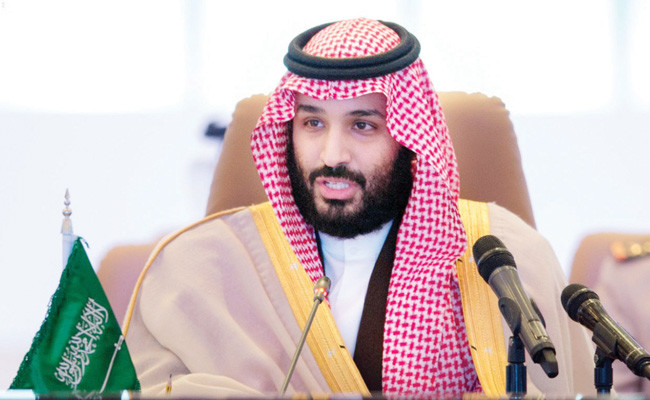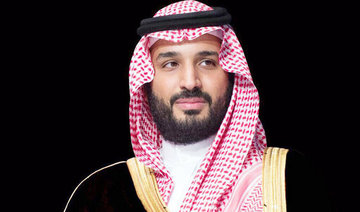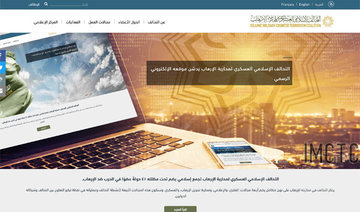RIYADH: Crown Prince Mohammed bin Salman has vowed that extremists will no longer “tarnish our beautiful religion.”
He was speaking at the opening of the inaugural meeting of the Islamic Military Counter Terrorism Coalition (IMCTC) Ministers of Defense Council in Riyadh on Sunday.
The crown prince said Sunday’s meeting sends “a strong signal that we are going to work together and coordinate together to support each other.”
“The biggest danger of this terrorism and extremism is the tarnishing of the reputation of our beloved religion... We will not allow this to happen,” he said. “Today, we start the pursuit of terrorism and we see its defeat in many facets around the world especially in Muslim countries... We will continue to fight it until we see its defeat.”
The crown prince also offered his condolences to Egypt, which suffered an attack on Friday by militants on a mosque in northern Sinai that killed 305 people.
“This is indeed a painful event and it is a recurrent and strong reminder of the dangers of this terrorism,” he said.
Saudi Arabia announced the alliance in December 2015. The alliance consists of 41 countries and identifies as a “pan-Islamic unified front” against violent extremism.
The IMCTC encompasses an integrated approach to coordinate and unite on the four key domains of ideology, communications, counter-terrorism financing, and military, in order to fight all forms of terrorism and extremism and to effectively join other international security and peacekeeping efforts.
The coalition will develop, collect, shop and disseminate a wide range of information on counterterrorism programs and best techniques embarked on by member nations and international organizations.
Chiefs of staff from Muslim countries met in Riyadh in March 2016, and affirmed “their determination to intensify efforts in fighting terrorism through joint work according to their capabilities, based on the desire of each member country to participate in operations or programs within the IMCTC framework as per its policies and procedures, and without compromising the sovereignty of the Coalition member countries.”
The IMCTC acts in response to the threat of terrorism that has impacted Muslim and non-Muslim countries and has distorted the image of Islam.
During the meeting, IMCTC Acting Secretary General, Lt. Gen. Abdulelah Al-Saleh, outlined the coalition’s strategy, governance, activities and future plans.
In addition, eminent keynote speakers presented their perspectives on counter terrorism efforts in each of the IMCTC’s four key domains:
Dr. Mohammad Al-Issa, Secretary General of the Muslim World League, introduced the ideology domain, and the necessity of promoting a message that counters the narrative of violent extremist ideology and reaffirms Islamic principles of tolerance and compassion, through presenting the true nature of Islam and supporting ideological, psychological, and social reforms
Dr. Mohammad Al-Momani, Minister of State for Media Affairs of Jordan discussed the communications domain, and the importance of producing and disseminating factual, scholarly and engaging content to undermine and counter the appeal of violent extremism.
Dr. Ahmed Abdulkarim Alkholifey, Chairman and Governor of Saudi Arabian Monetary Authority, discussed Counter Terrorist Financing and the need to promote best practices and advance legal, regulatory, and operational frameworks in prevention, detection, and seizure operations.
General Raheel Sharif presented the military domain, which aimed to assist in the coordination of resourcing and planning of member country military CT operations; facilitate the secure sharing of military information; and encourage military CT capacity and capability building to ultimately deter aggression and violence.
Saudi crown prince vows not to allow extremists to tarnish ‘our beautiful religion’
Saudi crown prince vows not to allow extremists to tarnish ‘our beautiful religion’

Ministry of Culture launches crafts hackathon as part of Year of Handicrafts

- Registration open until Jan. 31
RIYADH: The Saudi Ministry of Culture has launched a crafts hackathon to bring together creators and innovators from diverse fields.
The event aims to generate innovative solutions for various aspects of the handicrafts sector, including marketing, design and production, the Saudi Press Agency reported on Thursday.
It aligns with the broader objectives of the Year of Handicrafts 2025.
The Ministry of Culture annually celebrates a distinctive Saudi cultural element, highlighting and celebrating it through projects and events.
The year 2025 has been designated as the Year of Handicrafts to solidify the position of handicrafts as authentic cultural heritage while promoting the practice, preservation and documentation of the craft, as well as its presence in contemporary life.
Registration for the hackathon is open until Jan. 31.
The selection of qualified participants will begin in early February, followed by a two-day training camp on Feb. 14-15.
It targets a diverse range of participants, including artisans, designers, developers and programmers. Teams must consist of at least three and no more than five members.
All participants must be at least 18 years old.
Handicrafts have long held a special place in Saudi Arabia’s cultural fabric, representing a prosperous heritage passed down through generations.
Throughout 2025, the ministry will organize an array of events, exhibitions, educational programs and competitions under the banner Year of Handicrafts.
Saudi Foreign Minister receives his Syrian counterpart

Saudi Foreign Minister Prince Faisal bin Farhan received on Thursday his Syrian counterpart, Asaad Al-Shibani, in Riyadh, Al Arabiya TV reported.
Al-Shibani arrived with a high-level Syrian delegation, including Defense Minister Marahf Abu Qasra and Intelligence Chief Anas Khattab. They were welcomed at King Khalid International Airport by Saudi Deputy Foreign Minister Waleed Elkhereiji, according to the Saudi Press Agency.
This marks Al-Shibani's first foreign trip since the ouster of former Syrian president Bashar Assad on December 8. The visit comes after Syria’s new leader, Ahmed Al-Sharaa, praised Saudi Arabia's potential role in shaping Syria’s future during an interview with Al Arabiya on Sunday.
Saudi Arabia launches air bridge to deliver urgent aid to Syria

RIYADH: Saudi Arabia on Wednesday launched an air bridge to deliver essential aid to Syria, supporting efforts under the new leadership to rebuild the country after years of civil war.
Two planes carrying relief supplies landed at Damascus International Airport, Saudi aid agency KSrelief told Arab News.
The planes, which left from King Khalid International Airport, carried food, shelter and medical supplies, along with a KSrelief team to help address the difficult conditions faced by the Syrian people, KSrelief said.
Dr. Abdullah Al-Rabeeah, supervisor general of KSrelief, said: “The air bridge launched on Wednesday will be followed by a land bridge in the coming days to provide urgent relief to the Syrian people.”
Al-Rabeeah said that the humanitarian initiative reflects Saudi Arabia’s commitment to supporting those in need worldwide, reaffirming the Kingdom’s dedication to assisting nations in crisis.
He also highlighted Saudi Arabia’s consistent support since the Syrian crisis began in 2011 and its significant role in international humanitarian efforts.
Al-Rabeeah said that, through KSrelief, Saudi Arabia has continuously provided aid to internally displaced Syrians, refugees in neighboring countries, and victims of the northern Syrian earthquake in February 2023.
According to KSrelief, the Kingdom’s total aid to the Syrian people from 2011 to the end of 2024 exceeds $856 million.
The first aircraft was received by Abdullah Al-Harees, charge d’affaires of the Saudi Embassy in Syria; Mohammed Hazem Bakleh, president of the Syrian Arab Red Crescent; and several media representatives.
Al-Harees emphasized that this assistance is part of Saudi Arabia’s ongoing humanitarian efforts through KSrelief, aimed at alleviating the suffering caused by the crisis in Syria.
Bakleh expressed deep gratitude to Saudi Arabia for its humanitarian aid, noting that the relief will be distributed to those in need in all Syrian territories, without discrimination.
Syrian high-level delegation arrives in Saudi Arabia

- Delegation includes FM Asaad Al-Shibani, Defense Minister Marahf Abu Qasra, and Intelligence Chief Anas Khattab
RIYADH: A high-level Syrian delegation headed by Foreign Minister Asaad Al-Shibani arrived in Saudi Arabia Wednesday night, the Saudi Press Agency said.
The delegation, which includes Defense Minister Marahf Abu Qasra and Intelligence Chief Anas Khattab, was received by Saudi Deputy FM Waleed Elkhereiji at Riyadh’s King Khalid International Airport.
Al-Shibani, said on X on Monday that he had accepted an invitation from his Saudi counterpart Prince Faisal bin Farhan to visit the Kingdom, in what would be his first foreign trip since the ouster of former president Bashar Assad on Dec. 8.
It follows comments made by Syria’s new leader, Ahmed Al-Sharaa, who said Saudi Arabia had a major role to play in his country’s future during an interview with Al Arabiya, which aired on Sunday.
“Saudi Arabia has a major role in Syria’s future, and I take pride in everything it has done for us,” he said, adding that he spent his early childhood in Riyadh and hoped to visit the city again.
Al-Sharaa also praised recent Saudi statements as “very positive” and commended Riyadh’s efforts toward stabilizing Syria.
Saudi Arabia condemns New Orleans attack

- Texas man crashed a pickup truck into a crowd in New Orleans’s French Quarter before opening fire with a gun, killing at least 10 people and injuring 35
RIYADH: Saudi Arabia condemned and denounced on Wednesday a deadly car ramming in New Orleans, Louisiana, that struck a crowd celebrating New Year’s Eve.
A 42-year-old Texas man crashed a pickup truck into a crowd in the city’s French Quarter before opening fire with a gun, killing at least 10 people and injuring 35, in an early morning attack the FBI said was a potential act of terrorism.
The suspect was fatally shot in an exchange of gunfire with police. Potential homemade bombs were found in the truck and around the French Quarter, the FBI said.
A Daesh flag was also located in the vehicle, the agency added.
A Saudi Foreign Ministry statement expressed the Kingdom’s complete rejection and denunciation of all forms of violence.
It also expressed the Saudi Arabia’s solidarity and sincere condolences to the families of the victims, the American people, and the US government. It also wished the injured a speedy recovery.

















